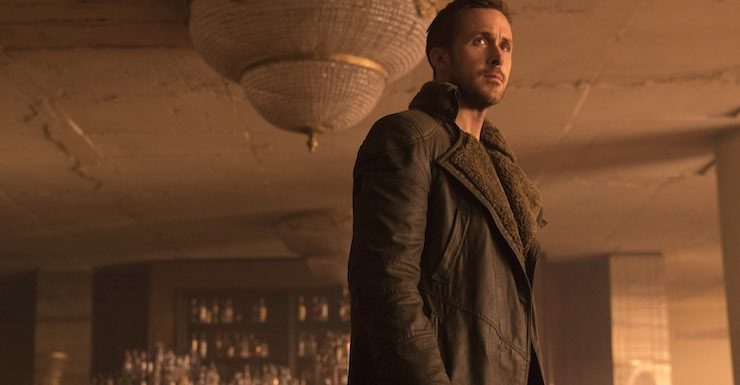Replicants may not live forever, but franchises sure can. Is that always best, though?
Blade Runner occupies a hallowed spot in pop culture’s pantheon. It’s timeless. It’s iconic. It’s gorgeous. It’s very nearly a perfectly structured film — depending on the cut you’re watching. Was there a need for more? Of course not. Compared to Ridley Scott’s other science fiction franchise, Blade Runner’s cinematic universe doesn’t have a clear-cut villain to bring back again and again in new and increasingly muddled situations.
Unless you see Ridley Scott as the real villain of the recent Alien movies.
In Blade Runner 2049, director Denis Villeneuve, fresh off his Oscar-winning Arrival, inspires a confidence Scott himself is unable to earn and brings a new philosophy to an old story.
Spoilers ahead, skinjobs and meatbags.
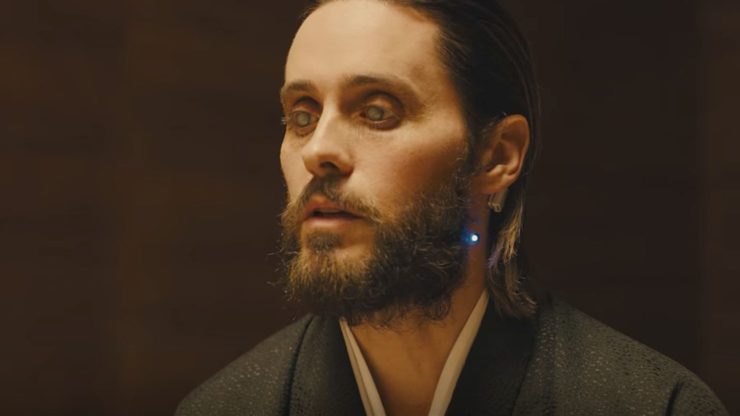
Clocking in at nearly three hours, there’ a lot to digest in 2049 and one viewing is definitely not enough.
I personally avoided many of the trailers going into the movie, but did watch the three short prequel films, which were all fascinating in different ways. We were introduced to Niander Wallace’s new model of replicant “angels,” improving on the work of the Tyrell Corporation by giving replicants a natural lifespan and an unwavering (supposedly) obedience. There are no illusions that these replicants are more human than human, though they are just as hard to distinguish physically from flesh and blood humans on first appearance. Still, obedience is key as Wallace (Jared Leto, who plays a better creepy scientist than Guy Pearce’s Peter Weyland, at least) reminds us that great civilizations are always built on the backs of a disposable workforce. In 2049, Wallace can no longer keep up with that demand and seeks the key to producing self-replicating replicants.
Villeneuve and cinematographer Roger Deakins (whose work is featured in most Coen Bros. movies, as well as The Assassination of Jesse James by the Coward Robert Ford) set the stage perfectly. That “great civilization” remains off-world and off-screen, as it did in the first Blade Runner, but things have only gotten worse on Earth, a point made all the more clear by what is not seen: open spaces, families, the color green.
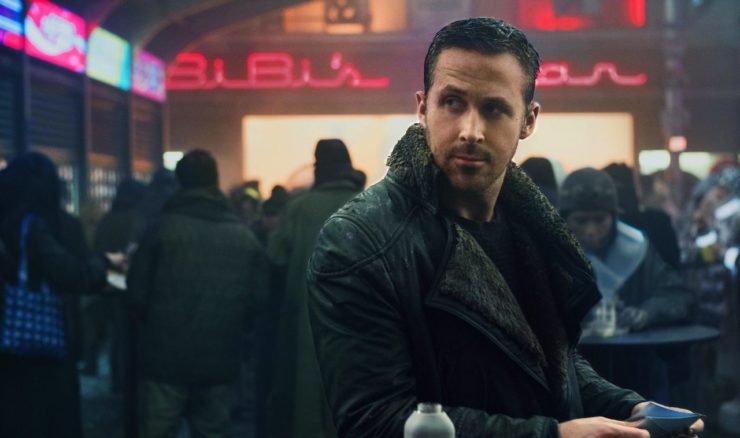
Ryan Gosling plays Officer K, a replicant Blade Runner tasked with hunting down an old Nexus 8 model that has assimilated into society—still an unforgivable crime in this future. Chasing the rogue skinjob down to his lonely protein farm, K unearths a deeper mystery and a miracle that makes him question his programming. Without giving too much of that mystery away, 2049 still teases viewers with the “Is he or isn’t he?” question, but in a manner which is simultaneously more direct and more subversive than anything Harrison Ford’s Deckard ever embodied.
Is K more human than human? Or just a human?
I do hate to take away the surprises that come again and again because Gosling does a fantastic and subtle job playing a character in a fundamental existential crisis. 2049 is best when it’s showing us private interactions between different classes of artificial intelligence. I was disappointed with Prometheus as an Alien movie; I was much more fascinated with Michael Fassbender’s android character David roaming the starship Prometheus by himself before all the annoying human crewmates woke up from their cryo-sleep. I could have watched that movie for two hours.
Blade Runner 2049 is kind of like that movie. But for three hours.
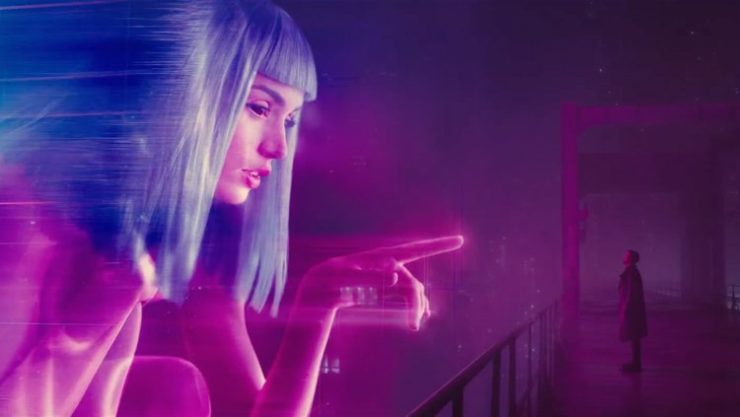
What does K do when he is not on the job humans have tasked him with? He has a pantomime of romance with a manic pixie dreamgirl app, Joi. This is a pivotal relationship that informs K’s understanding of the relationship Deckard had with Rachel (Sean Young) thirty years prior. And yet, one gets the sense that in this future, most people on Earth are like K and are more connected to their tech than to each other. That K is also an artificial intelligence makes this “love” more voyeuristic and uncanny, but, unfortunately, the concept of Joi isn’t as well-realized as what you can see in Spike Jonze’s Her or even an episode or three of Black Mirror. The robot pride movement gets only a few minutes; more plausible science fiction suggests that a truly new and/or alien intelligence wouldn’t wish to be a “real” human at all because humans are boring and prone to failure.
The roles for women in the Blade Runner universe haven’t changed very much, and that’s definitely an aspect I didn’t like here. 2049 is a man’s world and women are still mostly pretty dolls. They are there to serve men the illusion of traditional domestic bliss, they are street urchin prostitutes, they are towering hologram advertisements of Russian ballerinas, or naked pornbots striding between blocks of favelas. And when women are not merely decorative—living out existences which, in fairness to Villeneuve, are often portrayed as hollow—a central female figure is still defined mainly by childbirth. The exceptions to this are LAPD Lt. Joshi, played by Robin Wright, who has recently become the go-to actress for tough female characters of a certain age (i.e. over 30) and Niander Wallace’s #1 overachieving employee replicant, Luv (Sylvia Hoeks).
What does she do when she’s alone? That’s not at all the point here, yet exploring this question would’ve made the world more immersive.
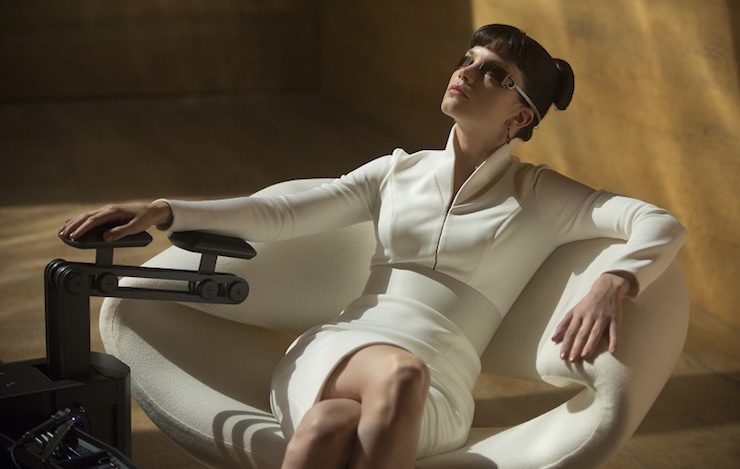
But building on the considerable foundation of the original Blade Runner is quite enough to satisfy wary fans. There are close-ups of eyeballs, stunning aerial shots of urban sprawl, neon, noodles, Pan-Am logos, and light-up umbrellas. Edward James Olmos makes some origami. Hans Zimmer’s score is atmospheric and riffs on some classic Vangelis themes. And there is Harrison Ford reprising another iconic role. (What’s next? Witness 2: Witness Harder?) And, no, just because we see a gruffer, older Deckard does not mean he is definitely human. So the debate continues.
Deckard and K are two sides of the same coin, and Blade Runner’s pacing picked up considerably when they finally meet in a radioactive Las Vegas. This is not to say Blade Runner 2049 doesn’t earn its running time, but the very cerebral plot becomes more lively in the final act, when we see some serious ass-kicking and flying car chases. Villeneuve knows how to stage thrilling action sequences, if not a coherent debate on bioethics and sociology.
The only glaring aspect missing from the original movie is that there are no characters in 2049 I’d remember as well or as fondly as Rutger Hauer’s Roy Batty—though I did really love David Bautista’s brief screentime as Sapper Morton, the Nexus 8 K hunts down in the beginning and the central figure of the second promotional 2049 prequel short film, 2048: Nowhere to Run.

In the end, I am still thinking of Blade Runner 2049 days after seeing it and, in that respect, I’m relieved that I kept my expectations tempered going in and came out mostly enjoying the endeavor. Blade Runner 2049 occupies a liminal space between future noir, nostalgia, and post-modern dystopia fiction. The scope of the movie is large, but the story of one Everyman replicant’s hope and purpose is uplifting, and hints at future rebellion and recognition of an underclass deserving of a new definition. Whether this in turn means that more movies are definitely coming, or are even warranted, time will tell, but K’s story concludes in a satisfying way and I’m grateful that Ridley Scott handed the reins to Denis Villeneuve, who is certainly following in the master’s footsteps while establishing his own strong vision.
Eyeballs and all.
Blade Runner 2049 is in theaters everywhere now.
Theresa DeLucci is a regular contributor to Tor.com. She’s also talked pop culture for Boing Boing, Den of Geek, B&N’s Sci-Fi & Fantasy Blog and Wired.com’s Geek’s Guide to the Galaxy. She won’t live forever. But, then again, who does? In the meantime, follow her on Twitter.










